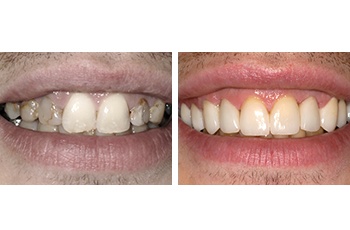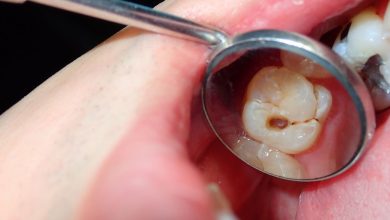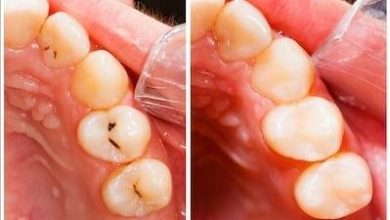Can Tooth Decay Be Reversed? Discover the Ultimate Solution!

Tooth decay can be reversed through proper dental care and treatment from a dentist. Dental care and treatments can help stop the progression of decay and restore the affected tooth’s health.
Regular brushing, flossing, and using fluoride toothpaste are essential for preventing and reversing tooth decay. Visiting a dentist for professional cleanings and treatments like fillings or dental sealants can also reverse decay and promote oral health. Maintaining good oral hygiene practices, combined with professional dental care, can effectively reverse tooth decay and prevent further damage to the teeth.
Understanding Tooth Decay And Its Causes
Tooth decay is a common dental problem that can have serious consequences if left untreated. It is important to understand what exactly tooth decay is and what causes it in order to prevent and reverse its effects.
Tooth decay, also known as dental caries, occurs when the enamel and dentin of a tooth are damaged by the acids produced by bacteria in the mouth. This damage is caused by a combination of factors such as poor oral hygiene, frequent snacking, sugary and acidic foods, and a lack of fluoride.
Addressing tooth decay promptly is crucial to prevent further damage to the tooth and potential complications such as tooth loss or infections. Regular dental check-ups and cleanings, proper brushing and flossing techniques, and a balanced diet low in sugar and high in nutrients are key in preventing and reversing tooth decay.
The Process Of Tooth Decay
Tooth decay is a common problem that many people face. The process of tooth decay begins with the formation of plaque and tartar, which are sticky substances that accumulate on the teeth. Over time, these substances can cause demineralization and erosion of the enamel, the protective outer layer of the teeth. This can lead to the advanced stage of tooth decay, characterized by dentin decay and cavity formation.
To prevent tooth decay, it is important to maintain good oral hygiene practices such as brushing and flossing regularly. It is also recommended to limit the consumption of sugary and acidic foods, as these can contribute to the formation of plaque and tartar. Regular dental check-ups and cleanings are essential for detecting and treating tooth decay at its early stages.
In addition to following these preventive measures, it is possible to reverse tooth decay in its early stages through remineralization. This involves using products that contain fluoride, which helps to strengthen the enamel and reverse the initial signs of decay.
Traditional Approaches To Treating Tooth Decay
When it comes to treating tooth decay, there are several traditional approaches that dentists may recommend. One common method is dental fillings and restorations, where the decayed part of the tooth is removed and replaced with a filling material such as amalgam or composite resin. This helps to restore the function and appearance of the tooth.
If the decay has progressed extensively and affected the tooth’s pulp, root canal therapy may be necessary. This involves removing the infected pulp, disinfecting the area, and sealing it with a filling material. Root canal therapy can save the tooth and prevent the need for extraction.
However, in some cases, tooth extraction may be the only option if the decay is severe and irreversible. This is usually considered as a last resort when other treatments are not possible or have failed.
Exploring Reversal Options For Tooth Decay
htmlTooth decay, although common, can be a concerning issue. However, there are options available for reversing this condition. One such approach is tooth remineralization, which focuses on replenishing lost minerals in the tooth enamel and repairing early-stage decay. This method can be facilitated through natural remedies or dental products designed to promote remineralization.
Introduction To Tooth Remineralization
Tooth remineralization is a process that aims to repair and strengthen tooth enamel using minerals such as calcium, phosphate, and fluoride. By reintroducing these minerals into the enamel, the tooth’s structure can be gradually restored. The remineralization process can help reverse early signs of decay, such as white spots, and prevent further damage.
Natural Remedies For Remineralization
Several natural remedies can aid in tooth remineralization. These may include maintaining a balanced diet rich in essential vitamins and minerals, such as calcium and vitamin D. Additionally, using fluoride toothpaste and mouthwash can provide an extra remineralizing boost. Certain herbal remedies, like licorice root and neem, have also been suggested to promote remineralization, although further research is needed to validate their effectiveness.
Dental Products Promoting Remineralization
| Product | Description |
|---|---|
| Fluoride toothpaste | Contains fluoride that helps strengthen enamel and prevent decay |
| Calcium and phosphate mouthwash | Provides additional minerals to support enamel remineralization |
| Remineralizing gels | Formulated with components that aid in tooth repair and restoration |
By incorporating these dental products into your oral care routine, you can enhance the remineralization process and potentially reverse tooth decay.
The Role Of Diet In Reversing Tooth Decay
Understanding the impact of sugary foods and beverages is crucial in reversing tooth decay. Such items are known to contribute to the growth of harmful bacteria in the mouth, leading to acid production and subsequent enamel erosion. Incorporating nutritional strategies that promote dental health can help prevent and reverse decay.
A diet rich in calcium and phosphorus is vital for maintaining strong teeth. These nutrients are found in foods like milk, cheese, yogurt, and nuts. Consuming vitamin D-rich foods such as fatty fish and eggs promotes proper absorption of calcium, which aids in the remineralization process of tooth enamel.
Moreover, foods high in antioxidants and polyphenols, like green tea, berries, and dark chocolate, can reduce inflammation and fight off harmful bacteria in the mouth. Crunchy fruits and vegetables like apples and celery can stimulate saliva production, which helps in neutralizing acids and preventing decay.
| Food | Benefits |
|---|---|
| Dairy products | Rich in calcium and phosphorus |
| Fatty fish | Source of vitamin D for calcium absorption |
| Nuts | Provide calcium and minerals for enamel repair |
| Green tea | Contains polyphenols that inhibit bacteria growth |
| Berries | High in antioxidants to reduce inflammation |
| Dark chocolate | Rich in antioxidants and beneficial minerals |
By adopting a balanced diet and incorporating these tooth-friendly foods, it is possible to reverse tooth decay and promote a healthy smile.

Credit: www.medicalnewstoday.com
Lifestyle Changes For Preventing And Reversing Tooth Decay
Tooth decay is a common dental problem that can have serious consequences if left untreated. However, the good news is that with the right lifestyle changes, it is possible to prevent and even reverse tooth decay. One of the most important factors in maintaining good oral health is practicing proper brushing and flossing techniques. Regular and thorough brushing at least twice a day, using a fluoride toothpaste, can help remove plaque and bacteria that can contribute to tooth decay. Flossing daily is also essential to reach areas that brushing alone may miss.
In addition to oral hygiene practices, it is important to schedule regular dental check-ups and professional cleanings. Dentists are able to identify early signs of tooth decay and treat them before they progress. Professional cleanings can remove hardened plaque, known as tartar, that cannot be removed by brushing alone. Regular visits to the dentist also provide an opportunity to address any concerns or questions about oral hygiene practices.
The Ultimate Solution: Combining Reversal Techniques
| The Ultimate Solution: Combining Reversal Techniques | |
| Utilizing multiple approaches for effective results | |
|
Personalized treatment plans for reversing tooth decay:
|
Collaboration between patients and dentists for success:
|
Long-term Strategies For Maintaining Dental Health
Establishing a consistent oral care routine: To reverse tooth decay, it is essential to establish a regular oral care routine. This includes brushing your teeth twice a day, using a fluoride toothpaste and a soft-bristled toothbrush. Make sure to replace your toothbrush every three to four months or when the bristles become frayed. Regularly flossing between your teeth and using an antiseptic mouthwash can also be beneficial.
Tips for preventing future tooth decay: In addition to a consistent oral care routine, there are several steps you can take to prevent future tooth decay. Limiting sugary foods and beverages is essential, as sugar contributes to the formation of plaque. Reducing the frequency of snacking and maintaining a balanced diet are also important. Regular dental check-ups and cleanings with a professional can help identify any early signs of tooth decay and address them promptly.
Promoting overall oral health for a lifetime: Along with preventing tooth decay, you should focus on promoting overall oral health. This includes avoiding tobacco products and limiting alcohol consumption, which can contribute to oral health issues. Additionally, wearing a mouthguard during physical activities and addressing any teeth grinding or clenching habits can help protect your teeth. Finally, maintaining good oral hygiene habits throughout your lifetime will help ensure long-term dental health.
Frequently Asked Questions For Can Tooth Decay Be Reversed?
Is It Possible To Reverse Tooth Decay?
Yes, it is possible to reverse tooth decay by practicing good oral hygiene, such as brushing and flossing regularly. Additionally, a healthy diet low in sugar, regular dental check-ups, and fluoride treatments can help prevent and even reverse early stages of tooth decay.
Can A Fully Decayed Tooth Be Saved?
No, a fully decayed tooth cannot be saved and must be extracted to prevent further damage or infection.
How Long Can It Take To Reverse Tooth Decay?
Tooth decay reversal time can vary depending on the severity. Early stages may be reversed with good oral hygiene and fluoride treatment. But advanced decay may require dental interventions like fillings or root canals, taking longer to reverse. Always seek professional advice for an accurate estimate.
Can Tooth Decay Be Reversed?
Tooth decay can be reversed in the early stages by practicing good oral hygiene, using fluoride toothpaste, and having regular dental check-ups. A dentist can remove the decayed part of the tooth and restore it with fillings. However, if the decay has reached advanced stages, it may require more extensive treatments such as root canal therapy or tooth extraction.
Conclusion
Although reversing tooth decay completely is not possible, early detection and preventive measures can help slow down or stop its progression. Maintaining good oral hygiene, adopting a healthy diet, and visiting the dentist regularly are crucial in preventing and managing tooth decay.
Remember, taking care of your oral health is essential for a beautiful and long-lasting smile.





